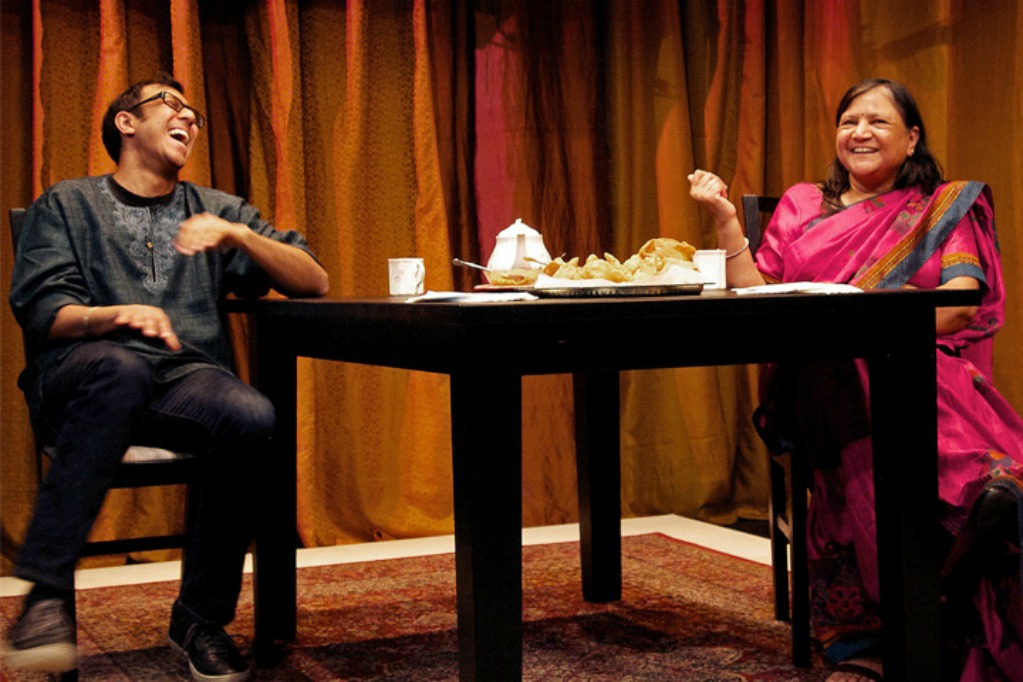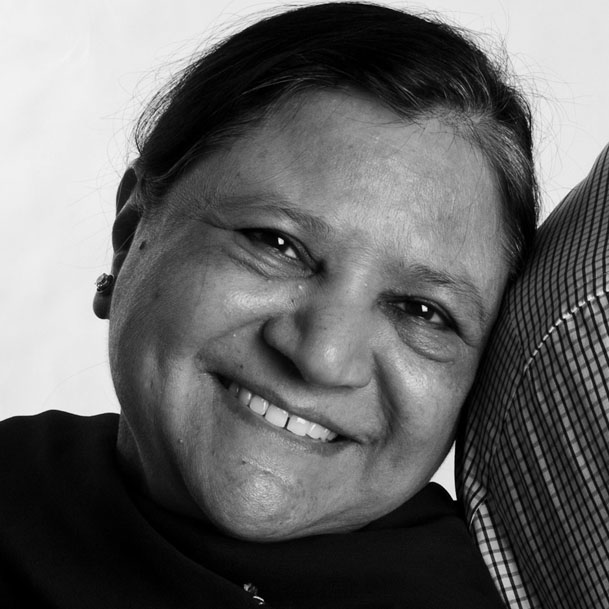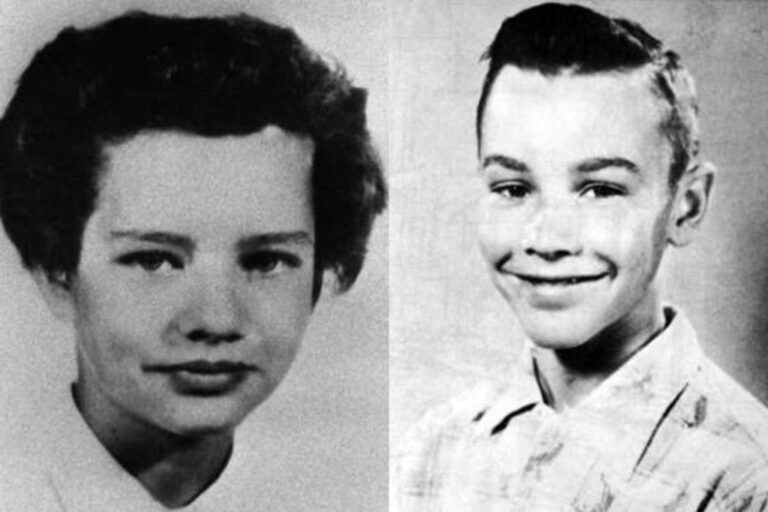Asha, In Her Own Words
During a family trip to India in 2007, Ravi Jain’s parents tried to rope him into an arranged marriage, very much against his wishes. He dealt with this generational and cultural clash in the most logical way possible: through theatre. In 2012, Ravi and his mother Asha produced A Brimful of Asha, a boundary-defying, nonfiction play about their family’s struggle. Asha chatted with Intermission editor Maija Kappler about her experience.
I had never acted before. Never even in my childhood. My father was very strict, and we had no permission to take part in any of that. And I never saw any theatre either. My elder son was doing Shakespeare at school, and they would invite me to come. This one time I went—first of all, I don’t have a very strong English background, so I don’t understand Shakespeare at all. I had a young family, my boys were growing up, I was helping my husband build the business, and I used to get very tired. As soon as I sat down in the dark and the quiet, I fell asleep and started snoring. Ravi was sitting beside me, and he elbowed me, he said I was being rude. I said, “What’s rude? I’m tired! Let me sleep!”
(Ravi holds that grudge still, you know. He’ll say, “She never liked what I did! She never came, she never appreciated my plays!”)
A Brimful of Asha started all in joke. When [the trip to India] happened, Ravi was very upset. He told all his friends: Look at how bad it is, what my parents are trying to do to me. They said it would make a good movie. He says, I’m not a movie person, I’m a theatre person. I’m going to make theatre. Then he came home, he told me, “Mom, I’m going to make fun of you onstage.” So I said, “Oh, yeah? You’ll make fun? If you take me with you, people will agree with me more. They’ll see that I’m more right than you.”
Before that, I was a really shy person. I used to freeze on the mic. But when he challenged me like that and we went to joke onstage—it was only a fifteen or twenty-minute skit at first, at Passe-Muraille—people just loved it. They laughed and laughed.
We were checking the idea, seeing how people were responding to it. People liked it. After one year, it went to Tarragon. Most plays are done the other way: first the script comes, then they create the play. Ours was real conversation, and only later on we wrote it down, gave it the shape of a play.
When Ravi and I talk, in real life and in the show, I’m always interrupting him. That’s the reason the whole play turned out funny—I didn’t have any training. When actors are trained they are asked to wait: when one is finished, then the second will go. I had no training, so I kept interrupting. Sometimes I made him forget the lines. It’s improvisation, so I just make up something to fill the air.
[The play’s set] is a home environment. As you can probably figure out, I’m a very talkative person. I love cooking, that’s another hobby. When I’m home, I’m all the time cooking. When Ravi’s friends come they sit around my kitchen, I tell them all kinds of stories. Ravi said: If I give you that environment, it will make you less nervous. You’ll be at home.
When we were going into this play, my other son warned me: You have to repeat the same lines every day, and if you can’t remember, you will ruin Ravi’s career before starting it! I was not nervous, I never got nervous or sweaty or anything. But I was very scared in my heart, deep down, that I will be hated by people. They will be thinking what a bad mother I am, a controlling mother. I thought they will throw tomatoes at me! That’s what I see in the movies. But to my surprise, people took it very nicely. They think I’m the victim, not Ravi! Since I am sandwiched in two cultures. I was brought up and raised in India. I raised my kids here. I don’t understand their things, and they don’t understand my culture. I love my culture—not 100 percent is good, but there are lots of things I would love to hold on to all my life.

Photo by Erin Brubacher
One time [after the show] one girl came up to me and started crying. She had an Italian background and she said, “My mom is always yelling at me and the next minute she’ll say, ‘What do you want to eat?’” She said, “I used to get angry but now I understand, this is love.”
Our culture is not saying I love you, honey and bunny. We yell at each other. That’s our love. With Ravi, I will be shouting at him all the time. With my husband, I’m screaming at him, he’s shouting at me. But it’s been forty years, and we’re still together.
Till now, we’ve done almost two-hundred and fifty shows. Wherever we are going, it’s sold out. We went to London, England; we went to Germany. Even in Canada, we got to see so many nice cities. We went to Victoria, Kamloops, Montreal, Ottawa. We did a small tour in North Bay, Thunder Bay, Hamilton, St. Catharine’s, Niagara. We’re coming for the sixth time to Toronto. On our last run, even Kathleen Wynne came with her sisters. Two or three sisters, she has. After the show she waited out back and she talked to us. We went to South Carolina, and it was a sold out show there. A three-hundred people theatre; five shows all sold out. People were saying, “Oh, I got the last ticket!”
When Ravi told me, “Mom, we are sold out, we have to add shows,” I did not believe him. I thought maybe he was just saying that.
One time in Victoria, one kid came up to me and he said, “I’m a little depressed nowadays, but your show cheered me up.” He was fifteen or sixteen years old! I said, “You’re so young to get depressed!” You know, Maija, if you ever get depressed, just give me a call and I will send you a ticket.
One time in Kingston, I met this girl. She had an interest in theatre, but her mom was resisting it. She said, “It’s through your play I understand what she’s saying, that she’s worried about how I would make a living.” The lifestyle in theatre and movies is so glamorous, but not everybody makes it to that level. If you don’t get there, then what is your life? We encouraged our kids to have some degrees, and then if you want to do a little bit of theatre you can do it as a hobby. But that’s not how it works—with theatre, either you’re completely in, or you’re not there.
It’s very funny but at the same time it’s very sad, what we went through as a family. We could have breaked down, we could have stopped talking. [Kids who come to the show,] they understand—maybe they don’t want to listen to their parents, they cover their ears—but they understand I’m doing it for Ravi’s benefit. Some people call me a star, but I don’t feel like a star for a minute! I’m a dedicated mother, doing my duty.
A lot of people cried in my show. Even some kids get very emotional. They come hug me after the show. One time one eighty-year-old guy was sobbing. That’s everybody’s life: it’s family, it’s personal. Lots of people go through these dramas every day, but nobody talks about it.
When we were in London, Ontario, Ravi took me to another play in the afternoon, because our show was in the evening. And I fell asleep again! Because I didn’t understand the story. So he dropped me home. If I don’t understand the story I’m so bored.
In our play I never saw that. We’re joking, everybody’s laughing so loud. No one falls asleep.
















Comments